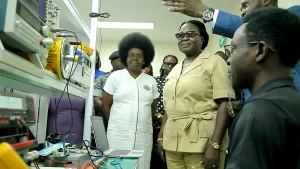Share
The government is working on a new policy shift that will require anybody applying for government positions to have a digital skills certificate.
According to the government, this is one method of encouraging digital service use as the country is digitized.
The International Computer Driver’s Licence is a document that will record an applicant’s individual computer capabilities, including knowledge of simple software such as Microsoft Word.
According to Dr Amina Zawedde, the permanent secretary of Uganda’s Ministry of ICT and National Guidance, the certificate will be required based on the level of digital skill required for each specific job and will be classified into three levels: basic, intermediate, and advanced (for more technically challenging jobs).
She stated that for individuals who are already in the government, efforts will be made to improve their abilities through required training, following which the certificate will be issued.
Dr. Zawedde was addressing yesterday at the Uganda Media Centre during an event to declare Uganda’s digital readiness in advance of the introduction of the Uganda Digital Transformation Roadmap.
Jessica Alupo, Vice President, will unveil the road map on Thursday.
“We have the road map to help us realize Uganda’s digital vision in a systematic way,” the permanent secretary explained.
“On several occasions, the President has informed us that the Government is prioritizing four sectors: agriculture, services, ICT, and industry as part of strategic efforts to foster economic growth and development,” she noted.
According to government figures, ICT has increased by 14.8% in the last few years and now accounts for almost 9% of the country’s GDP.
“This is a testament to the government’s strategic investment in infrastructure and capital development, which is now propelling the country’s E-services.” Today, when our guests arrive at Entebbe International Airport, they obtain their visas online in their home countries because E-services is one among the items we offer. “When we remit taxes, we do it all online,” the permanent secretary explained.
She stated that the United Nations Development Programme, civil society, and several other development partners assisted the government in developing the blueprint. The plan is a five-year plan project that outlines what the country will undertake in the short term (one year), medium term (three years), and long term (five years) to achieve its digital development goals.
“Our digital vision aligns our aspirational goals with Vision 2040, which outlines the concrete steps, key enablers, and milestones we expect to achieve over the next five years,” she explained.
Meanwhile, the National (NITA-U) new Information Authority has been established by the Government Technology. The Anti-Corruption Division of the High Court registrar, Pamella Lamunu Ocaya, administered the oath of office to the board on Friday last week at the NITA-U head office in Kampala. The occasion was presided over by Dr Chris Baryomunsi, Minister of ICT and National Guidance.
The development marked the end of ten months of the authority working without a board, which was apparently impacting some operational lines of the agency because the board lacked the necessary legal attire to take out specific activities.
Alexander Kibandama will lead the new board. Theodora Mondo, Michael Ochelo, Julius Otai, Annabella Basaza, Jacky Ochola Aneno, former Mityana District Woman MP Sylvia Namabidde, and Hatwib Mugasa, the authority’s current executive director, are among the members.












